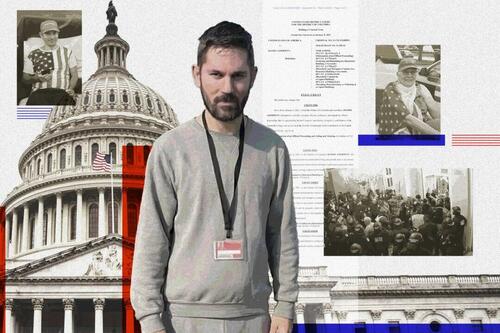Federal Judge Appears Ready To Reimpose Jan. 6 'Disinformation' Monitoring
Authored by Joseph M. Hanneman via The Epoch Times (emphasis ours),
Despite being slapped down by the U.S. Court of Appeals for ordering a Jan. 6 probationer’s computer use be monitored for so-called “disinformation,” a senior federal judge in Washington D.C. appears ready to reimpose the restriction on Daniel Goodwyn of Corinth, Texas.

Senior U.S. District Judge Reggie Walton ordered Mr. Goodwyn to “show cause” for why the computer monitoring provision should not be reimposed. Judge Walton set a June 4 hearing date on the issue in Washington.
Defense attorney Carol Stewart said Mr. Goodwyn’s appeal and the Court of Appeals ruling include the statute and relevant case law that explain why computer monitoring in this case is unconstitutional.
“The matter should be closed in my view,” Ms. Stewart told The Epoch Times in a statement. “The First and Fourth Amendments have not been wiped out of the U.S. Constitution yet.”
Computer monitoring could only be relevant if Mr. Goodwyn’s single misdemeanor trespassing crime on Jan. 6 had anything to do with computer use, but since it didn’t, the measure cannot apply to him, she said.
“The application of computer monitoring conditions to conduct invasive searches is covered extensively by case law, where the computer had to be used for the crime,” Ms. Stewart said. “And use could not have just been incidental or casual. The computer had to be integral to the crime.”
There is no speech aspect of 18 U.S. Code 1752(a)(1), the statute that covers the plea deal Mr. Goodwyn agreed to in the case, she said.
‘Minister of Disinformation’
“I am unclear and curious who the judge thinks besides himself will be the Minister of Disinformation for the court if Mr. Goodwyn expresses any views that differ from what the judge believes,” she said. “And how will the judge prevent spying on Mr. Goodwyn’s journalism, support for, and access to, Stophate.com?”
Mr. Goodwyn said he went to Jan. 6 events as a citizen journalist for the website Stophate.com. He pleaded guilty to one count of entering and remaining in a restricted building or grounds on Jan. 6.
He entered the building through the Senate wing door at 3:32 p.m. and spent 36 seconds inside the Capitol, security video shows.
Mr. Goodwyn was arrested on Jan. 29, 2021, in Sherman, Texas. He was charged in a superseding indictment on Nov. 10, 2021, with obstruction of an official proceeding, entering and remaining in a restricted building or grounds, disorderly and disruptive conduct in a restricted building or grounds, disorderly conduct in a Capitol building, and parading, demonstrating, or picketing in a Capitol building.
Mr. Goodwyn’s post-Jan. 6 speech caught the attention of Judge Walton when Mr. Goodwyn appeared on “Tucker Carlson Tonight” on Fox News Channel.
Judge Walton, when imposing a 60-day prison sentence in June 2023, said Mr. Goodwyn spread “disinformation” during Mr. Carlson’s program on March 14, 2023.
Judge Walton ordered that Mr. Goodwyn’s computer be subject to “monitoring and inspection” by a probation agent to check if he spread Jan. 6 disinformation during the term of his supervised release.
The U.S. Court of Appeals for the District of Columbia Circuit issued a per curiam order vacating the monitoring provision.
The appeals judges wrote that Judge Walton “plainly erred in imposing the computer-monitoring condition without considering whether it was ‘reasonably related’ to the relevant sentencing factors and involved ‘no greater deprivation of liberty than is reasonably necessary’ to achieve the purposes behind sentencing.”
A March 26 mandate that sent the issue back to Judge Walton said if he still wanted to impose computer monitoring, he must explain his legal reasoning, develop a record to support the provision, and ensure that what he orders follows federal supervised-release law and accords with constitutional protections.
Ms. Stewart said the logical course of action seemed clear after the Court of Appeals ruling.
“The judge had the option to simply change his sentencing judgement order to remove the computer monitoring special condition,” she said.


